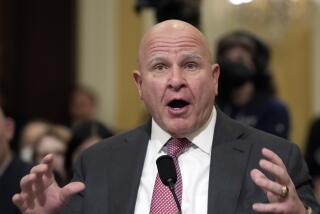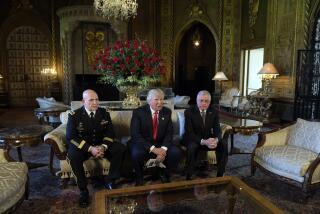McMaster out as national security advisor; former U.N. ambassador John Bolton to replace him

Tough conservative John Bolton will become Trump’s third national security advisor
Reporting from Washington — President Trump announced Thursday that he was replacing his national security advisor, Lt. Gen. H.R. McMaster, with John Bolton, a tough conservative with a sometimes irascible manner, in the latest move suggesting the president’s shift to a more hard-line foreign policy team.
The decision to name his third national security advisor, which Trump characteristically first disclosed in a tweet, follows months of speculation about McMaster’s potential ouster. Administration officials, speaking anonymously, have been saying for weeks that the president had tired of McMaster’s methodical approach to the job and wanted a more aggressive leader who would compel Cabinet secretaries to more quickly implement the president’s policies.
Coupled with Trump’s decision last week to replace Secretary of State Rex Tillerson with Mike Pompeo, currently the CIA director, the moves suggest that the administration will shed even more of the approaches favored by the Republican foreign policy establishment in favor of confrontational policies on subjects such as Iran and North Korea.
During roughly a year as the White House national security chief, McMaster never developed a tight bond with Trump. But the president developed a grudging respect for McMaster’s willingness to present him with advice that contradicted his impulses, aides have said. Still, the constant friction was clearly wearing on both men.
As recently as several days ago, White House aides had said Trump might keep McMaster at his side until after the planned summit with North Korean leader Kim Jong Un, which is scheduled for May.
“The timeline was expedited as they both felt it was important to have the new team in place, instead of constant speculation,” a White House official said, speaking on condition of anonymity. The official acknowledged that Trump and McMaster had been discussing the national security advisor’s departure “for some time.”
McMaster, a three-star general, will leave the White House in mid-April and plans to retire from the Army this summer, he said in a statement released by the White House.
On Twitter, Trump referred to Bolton, former ambassador to the United Nations, before McMaster, saying he was “pleased to announce” that Bolton would become national security advisor April 9. “I am very thankful for the service of General H.R. McMaster who has done an outstanding job & will always remain my friend,” Trump added.
In a subsequent statement, Trump paid tribute to McMaster’s three decades of military service.
McMaster’s departure comes at a fraught time for the White House as Trump prepares for the meeting with Kim. McMaster, who has been deeply involved in Korea policy, spent the previous weekend in San Francisco meeting with Japanese and South Korean security officials about how to orchestrate the meeting and maintain economic pressure on North Korea.
Trump also faces crucial decisions on the deal with Iran that the Obama administration negotiated to restrain that country’s nuclear program. He seems increasingly likely to abandon the pact, officials say. Trump cited disagreements over the Iran deal as a main reason for his decision last week to fire Tillerson.
Bolton has long been one of the GOP’s strongest voices and experts on national security issues, but one who has made many foes within the Republican foreign policy establishment.
He was U.N. ambassador in 2005-06 under President George W. Bush and has more recently served as a commentator for Fox News. He was initially considered by Trump to be secretary of State as he built his first Cabinet after the 2016 election, but Trump, then the president-elect, reportedly decided that Bolton, with his distinctive bushy mustache, didn’t “look” the part.
A national security advisor does not have to be confirmed by the Senate.
Trump’s first security advisor was Michael Flynn, who lasted less than a month before he was forced out, ostensibly for lying to his colleagues about contacts with the Russian ambassador.
McMaster was quickly brought in to replace Flynn, who has since pleaded guilty to lying to the FBI.
Even as their relationship foundered, Trump liked to lump McMaster into the group he proudly called “my generals,” along with White House Chief of Staff John F. Kelly and Defense Secretary James N. Mattis, both former Marine Corps generals.
McMaster’s approach to the job was informed, aides said, by his study of mistakes of the Vietnam War era, in particular the unwillingness of senior military leaders to challenge White House decisions. He turned his research on that topic, which he did for a graduate degree, into a book, “Dereliction of Duty.”
His take-away from that work was that advisors should be candid with presidents. Yet his effort to put that into practice did not endear him to Trump.
The war in Vietnam, McMaster wrote, “was not lost in the field, nor was it lost on the front pages of the New York Times or on the college campuses. It was lost in Washington, D.C.”
In particular, McMaster criticized senior military officers for remaining silent as President Lyndon B. Johnson and his advisors misled Congress and the public about the troop numbers in Vietnam in 1965.
In a passage with echoes perhaps in the present, McMaster wrote that the president “disregarded the advice he did not want to hear in favor of a policy based on the pursuit of his own political fortunes and his beloved domestic programs.”
Twitter: @ByBrianBennett
More to Read
Get the L.A. Times Politics newsletter
Deeply reported insights into legislation, politics and policy from Sacramento, Washington and beyond. In your inbox three times per week.
You may occasionally receive promotional content from the Los Angeles Times.











